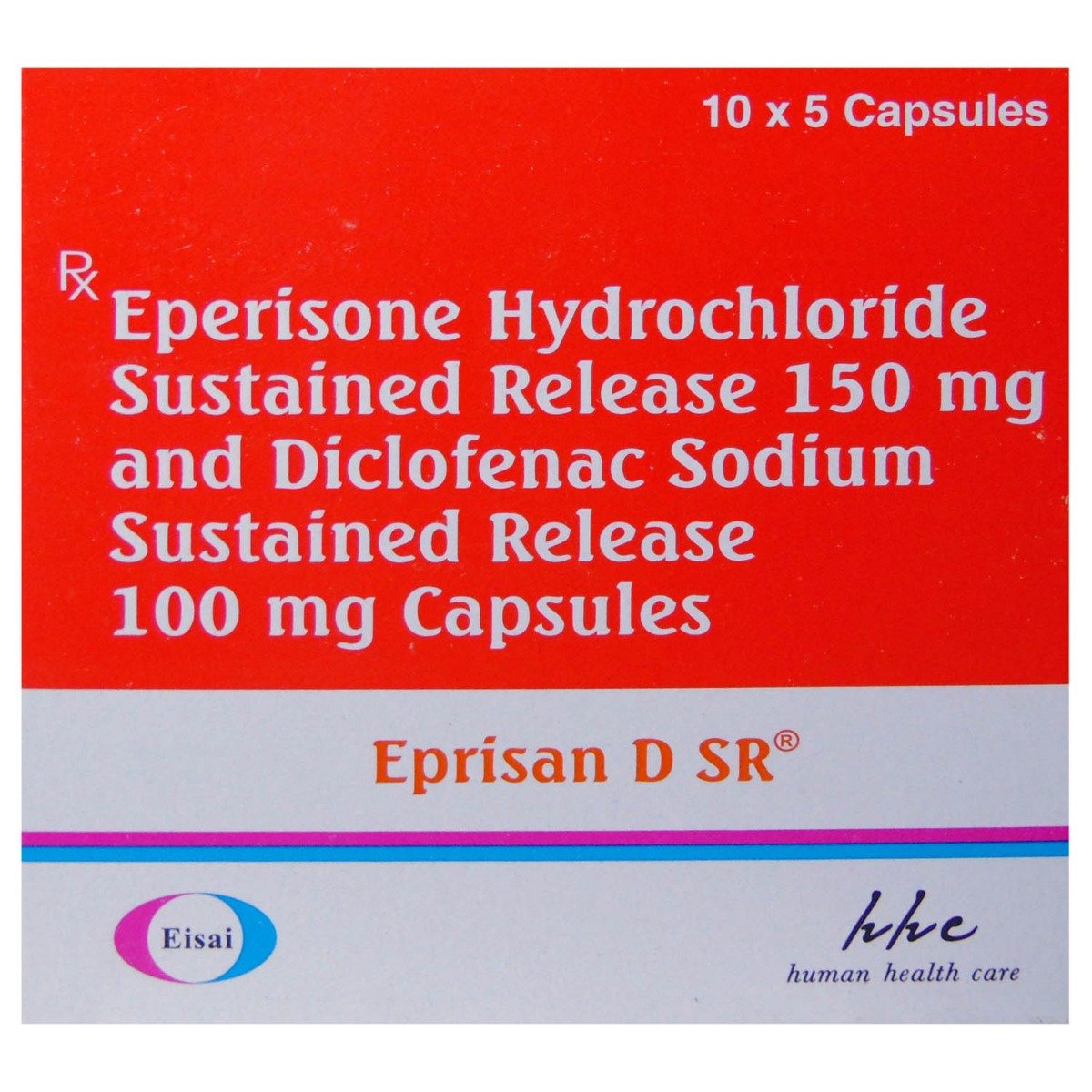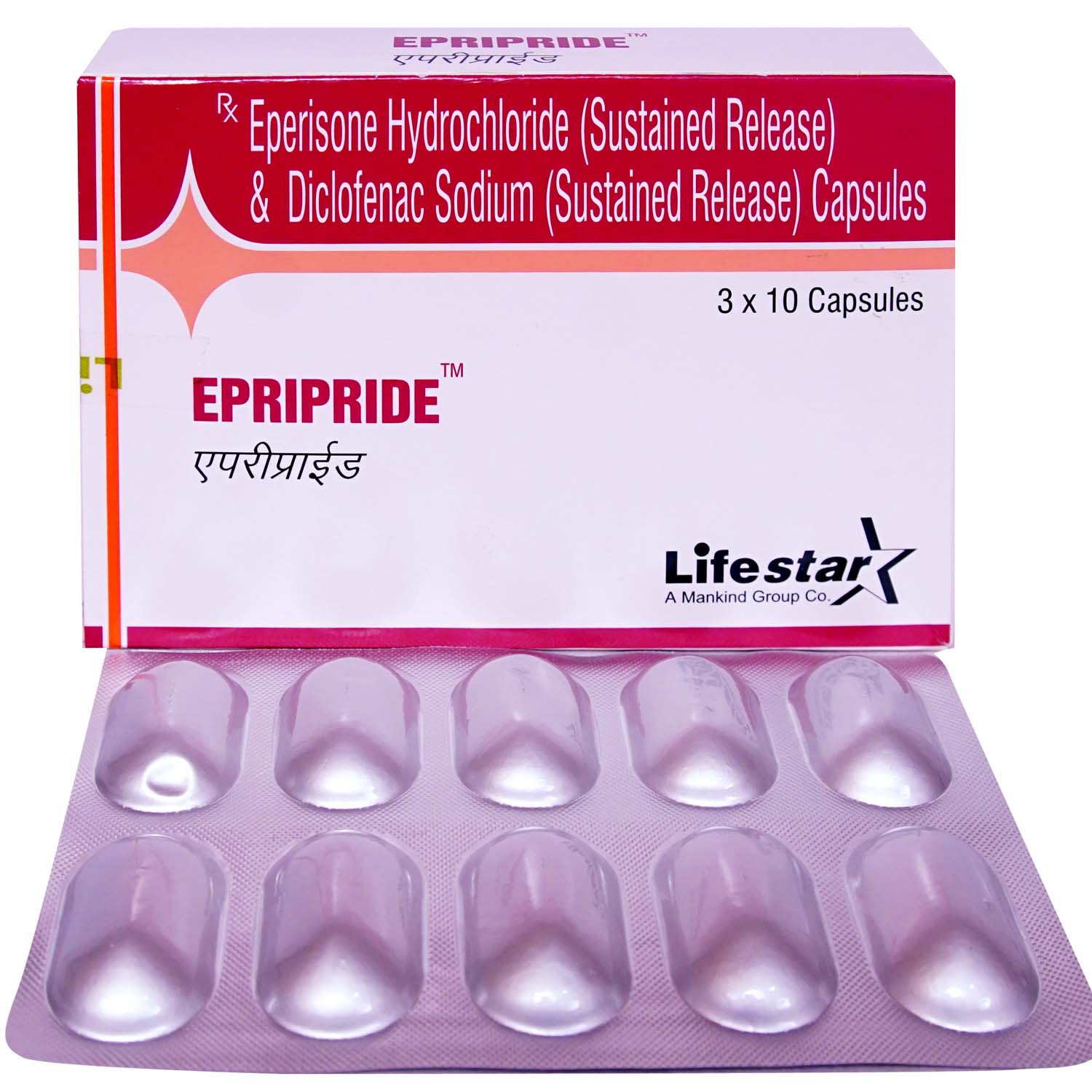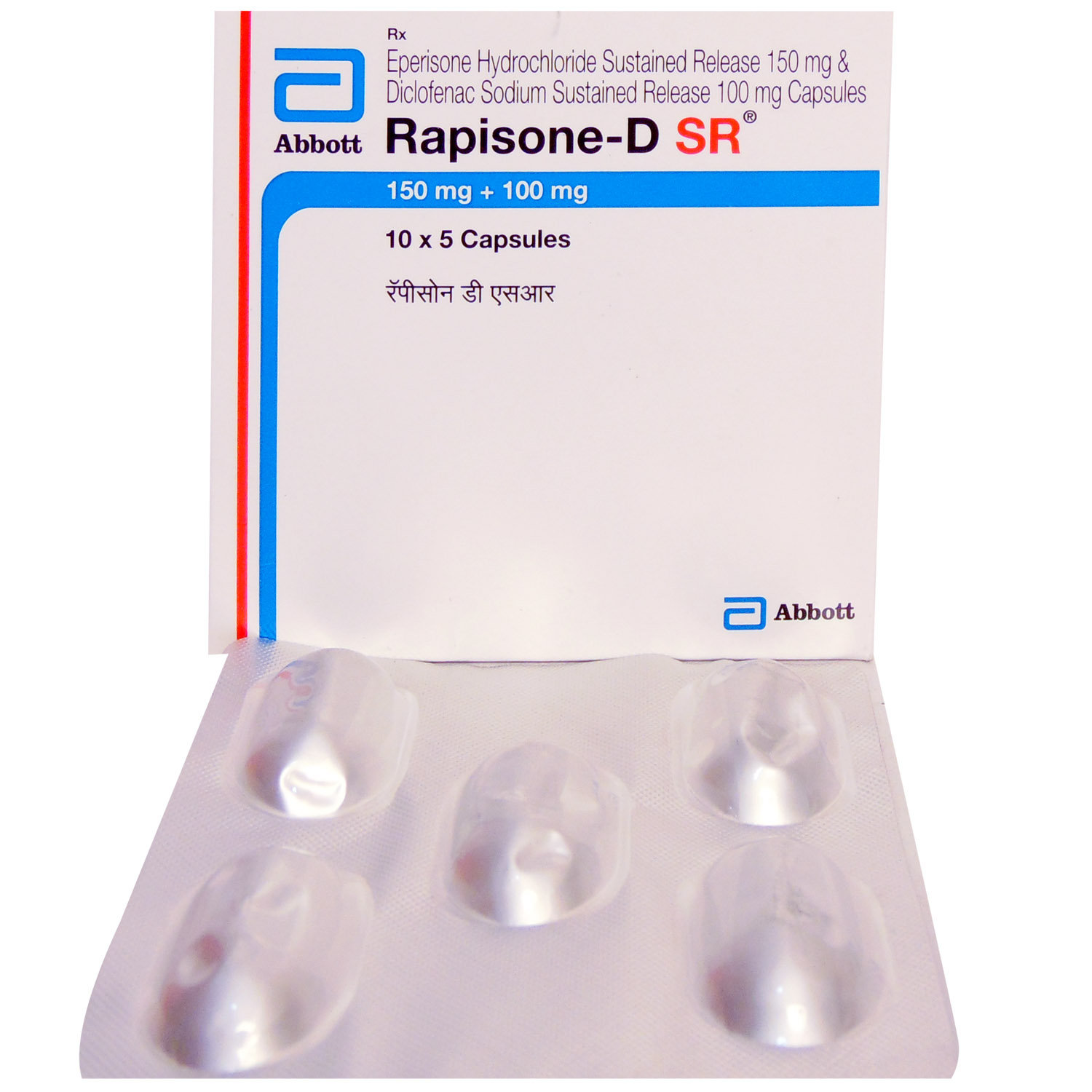Eperisone+diclofenac
About Eperisone+diclofenac
Diclofenac+eperisone belongs to the class of ‘analgesics’ used in treating acute musculoskeletal (bone, muscles, or ligaments) spasms associated with low back pain. Low back pain, also called lumbago, is a condition that affects the lower portion of the spine. It often occurs due to injury, strain, or sprain in the muscles, bones, or ligaments present in the lower back. In most cases, the only symptom of this condition is a pain in the lower back.
Diclofenac+eperisone contains Eperisone and Diclofenac. Eperisone is an antispasmodic. It works by relaxing skeletal muscles and reducing myotonia (inability of muscles to relax). It can relax vascular smooth muscles (present in the blood vessels wall) to improve blood circulation. It can also suppress pain reflex. Diclofenac is a nonsteroidal anti-inflammatory drug (NSAID). It works by reducing prostaglandins' production (chemical substances that cause pain and inflammation) at the affected site (muscle) and reduce pain.
You should use this medicine exactly as prescribed by the doctor. The common side-effects of Diclofenac+eperisone are nausea, vomiting, stomach pain, heartburn, diarrhoea, indigestion, flatulence (gas), loss of appetite, headache, weakness, drowsiness, dizziness, and skin rash or spots. These side-effects are usually mild and temporary. However, if any of these side-effects persist or get worse, inform your doctor immediately.
It is not recommended to take Diclofenac+eperisone if you are allergic to any contents of it. Before taking Diclofenac+eperisone, inform your doctor if you have bleeding or ulcer in the stomach, history of stomach or bowel problems with NSAIDs, severe liver, kidney, heart failure, history of heart attack or stroke, and problems blood circulation. It is not recommended in children, pregnant women, and breastfeeding mothers. It should be used with caution in elderly patients. Avoid consumption of alcohol as it may increase the risk of side-effects. Diclofenac+eperisone may cause dizziness or drowsiness, so do not drive or operate heavy machinery if you are not fully alert.
Uses of Eperisone+diclofenac
Medicinal Benefits
Diclofenac+eperisone is used to treat pain associated with muscle spasms that usually occur due to muscle strains, sprains, or injuries in the lower back. It contains eperisone and diclofenac. Eperisone is a muscle relaxant that shows an analgesic effect (relieve pain), whereas diclofenac can reduce pain, swelling, and inflammation in the muscles. It provides fast relief from pain, within a few hours after taking this medicine. It reduces muscle stiffness and enables the easy movement of the muscle. It is also well tolerated when taken at recommended doses. For the best results, rest and physical therapy are also essential along with this medicine.
Directions for Use
Storage
Side Effects of Eperisone+diclofenac
- Nausea
- Vomiting
- Stomach pain
- Heartburn
- Diarrhoea
- Indigestion
- Flatulence (gas)
- Loss of appetite
- Headache
- Weakness
- Drowsiness
- Dizziness
- Skin rash or spots
Drug Warnings
Before taking Diclofenac+eperisone, inform your doctor if you have any bowel disorders such as colitis (inflammation of the intestine), kidney or liver problems, porphyria (inherited blood disorder), bleeding disorders, asthma, seasonal allergies, long-term respiratory infections or illnesses, angina (chest pain), blood clots, high blood pressure, high cholesterol, diabetes, systemic lupus erythematosus (a skin disorder), smoking habit, and intolerance to some sugars. Diclofenac+eperisone increases the risk of heart attack or stroke if high doses are used for prolonged periods. So, use it in the dose and duration as prescribed by the doctor. If you notice chest pain, breathing difficulties, weakness, or slurry speech, inform your doctor immediately as it can be a sign of problems with heart or blood vessels. Diclofenac+eperisone is an anti-inflammatory and can mask the symptoms of an infection, so consult your doctor if you feel unwell.
Drug Interactions
Drug-Drug Interactions: Diclofenac+eperisone may interact with anticoagulant (warfarin), medications used to treat diabetes, an antidepressant (lithium), water pills, anticancer agent (methotrexate), medications that suppress the immune system (tacrolimus and ciclosporin), a medicine used to treat urinary tract infections (trimethoprim), quinolone antibiotics, other pain killers (aspirin and ibuprofen), a medication used to terminate the pregnancy (mifepristone), a medicine used to treat heart problems (digoxin), steroids, medications used to treat high blood pressure, a medication used to treat fungal infections (voriconazole), a medication used to treat fits (phenytoin), medications used to lower cholesterol levels (colestipol and cholestyramine), and a muscle relaxant (methocarbamol).
Drug-Food Interactions: Avoid the consumption of alcohol as it may increase dizziness and the risk of gastrointestinal bleeding.
Drug-Disease Interactions: Diclofenac+eperisone should not be used in patients with bleeding or ulcer in the stomach, history of stomach or bowel problems with NSAIDs, severe liver, kidney, heart failure, heart attack history or stroke, and problems with blood circulation.
Drug-Drug Interactions Checker List:
Safety Advice

Alcohol
cautionConsumption of alcohol increases the risk of side-effects, such as liver damage and bleeding in the stomach.

Pregnancy
unsafeDiclofenac+eperisone is usually not recommended during pregnancy, especially if you are more than six months pregnant as it may cause harmful effects to the unborn baby.

Breast Feeding
unsafeDiclofenac+eperisone may pass into breastmilk and cause unwanted effects in the nursing baby. So, it is not prescribed in breastfeeding mothers. However, if prescribed, the doctor may advise you to stop breastfeeding while using this medicine.

Driving
cautionDiclofenac+eperisone may cause dizziness or drowsiness, so do not drive or operate heavy machinery if you are not fully alert.

Liver
cautionDiclofenac+eperisone causes liver damage, so it should be used with caution in patients with liver diseases. The dose may have to be adjusted by your doctor.

Kidney
cautionDiclofenac+eperisone should be used with caution in patients with kidney diseases. The dose may have to be adjusted by your doctor.

Children
unsafeDiclofenac+eperisone is not recommended for children below 12 years of age.
Habit Forming
Diet & Lifestyle Advise
- Exercising regularly helps in muscle stretching so that they are less likely to spasm, tear, and sprain. Mild exercises such as jogging and walking are helpful for muscle stretching.
- Deep tissue massages with the help of muscle massager are considered helpful.
- Avoid wearing tight-fitting clothes, instead, wear loose garments.
- Rest well and get optimal sleep (at least 8 hours for adults).
- Hot or cold therapy can help treat muscle spasms.
- Apply an ice-pack or hot-pack on the muscle for 15-20 minutes.
- Try to include glycine (protein) in your daily diet, which is good food for your muscle.
Special Advise
- Your doctor may advise you to undergo regular blood tests to monitor liver function while using Diclofenac+eperisone if it is prescribed for longer durations.
- Take Diclofenac+eperisone with food to minimize side-effects associated with stomach and intestine such as diarrhoea/upset stomach.
Patients Concern
Disease/Condition Glossary
Low back pain: It is also called lumbago. It is a common condition that occurs due to injury, sprain, or strain to the muscles, bones, or ligaments present in the lower portion of the spine. The common causes are lack of regular exercise, improper postural lifting, bad or poor posture, and fracture. Pain in the lower back is the only symptom often seen with this condition. Analgesics (pain relievers) and physical therapy can help to relieve pain. Exercise helps in muscle stretching so that they are less likely to spasm, tear and sprain.
FAQs
Diclofenac+eperisone contains Eperisone and Diclofenac. Eperisone is an antispasmodic. It reduces muscle stiffness by relaxing the muscles and reducing pain by improving blood circulation and suppressing pain reflexes. Diclofenac is a nonsteroidal anti-inflammatory drug (NSAID). It works by reducing prostaglandins' production (chemical substances that cause pain and inflammation) at the affected site and reduce pain and swelling. Together, Diclofenac+eperisone can effectively treat pain due to muscle spasms.
The common side-effects of Diclofenac+eperisone are nausea, vomiting, stomach pain, heartburn, diarrhoea, indigestion, flatulence (gas), loss of appetite, headache, weakness, drowsiness, dizziness, and skin rash or spots. These side-effects are usually mild and temporary. However, if any of these side-effects persist or get worse, inform your doctor immediately.
Let your doctor know that you are taking Diclofenac+eperisone before undergoing surgery of the stomach or intestine as Diclofenac+eperisone can delay wound healing in some cases.
Diclofenac+eperisone is probably safe and well-tolerated in diabetic patients when taken at recommended doses. However, higher doses or prolonged use may affect sugar levels and cause unwanted effects. So, let your doctor know that you have diabetes before taking Diclofenac+eperisone.
It is recommended to take Diclofenac+eperisone with food or after a meal to minimize side effects such as upset stomach or diarrhoea.









